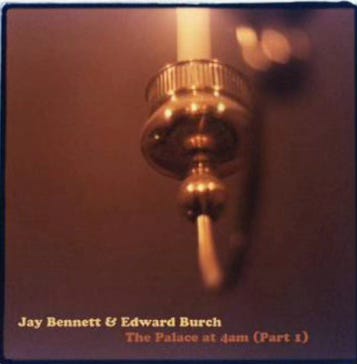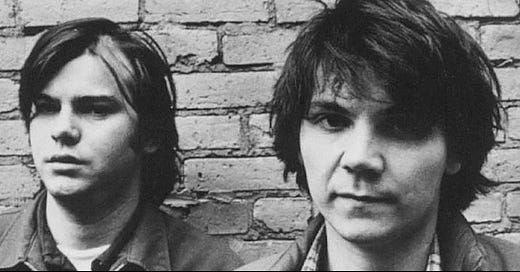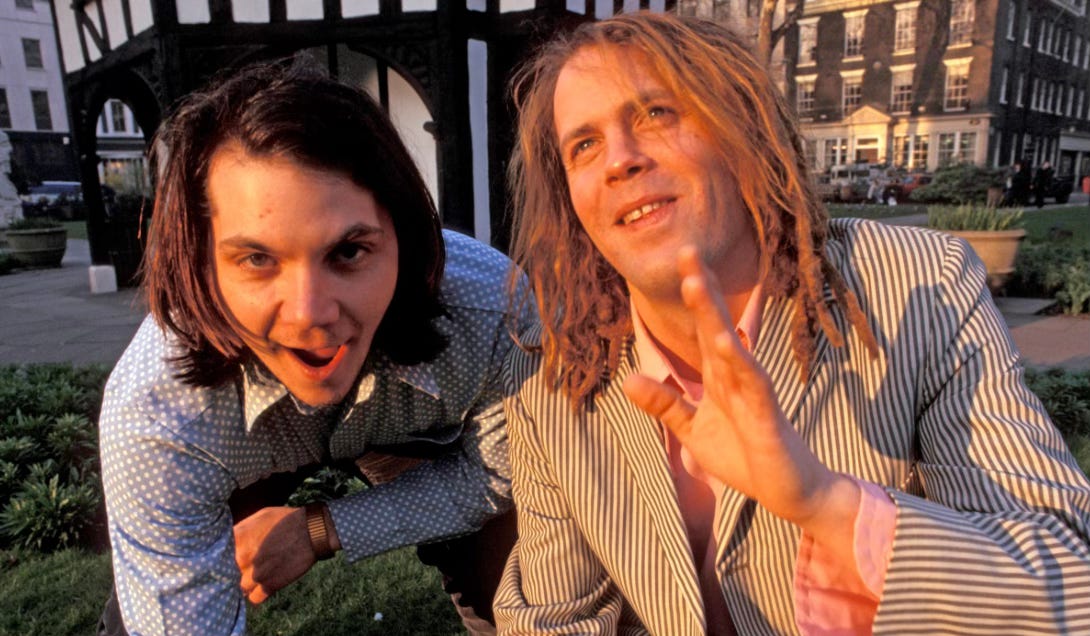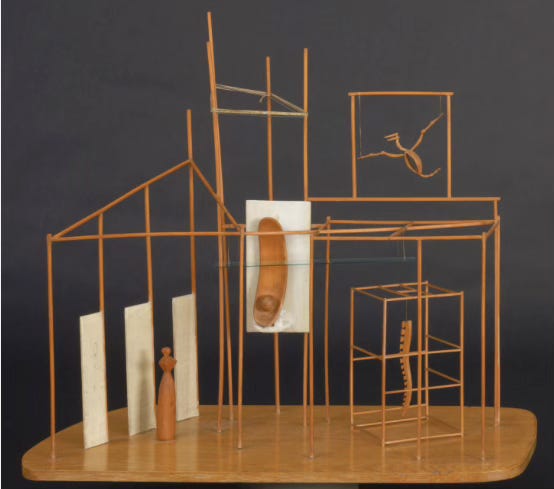Pick a side.
It’s a binary. One or the other. Either you’re with us or you’re against us.
Letterman or Leno.
Tupac or The Notorious B.I.G.
Taylor or Kanye.
Montagues or Capulets.
Jung or Freud.
Coke or Pepsi.
Celtics or Lakers.
Kobe or Shaq.
Liam or Noel.
Android or iPhone.
Waters or Gilmour.
Peeta or Gale.
Edward or Jacob.
Beatles or Stones.
John or Paul.
I would bet money anyone born after 1974 (and before, say, 2000) has an answer for each of those pairs1. Some of the rivalries are hot-bloodedly real, certified holy wars. And some of them are just the media overblowing something, smoke in the wind.
The divisiveness tends to get even more intense and blood-boiling when the two were previously partnered together, like John Lennon and Paul McCartney. Either side of the aisle can’t help but use the perceived rival as both a punching bag and a measuring stick. In 1971, what did John fans think of Paul’s latest incredible ballad “Maybe I’m Amazed”? Was it as good as John’s new anthem, “Imagine”? Which ode to their soulmate was better… “The Lovely Linda” or “Oh, Yoko!”? They thought they could escape the Beatles2, but they could never escape each other.
Or look at Paul Simon. I think we can all agree that the average listener, after the dissolution(s) of Simon & Garfunkel, accepted that Simon was the more-talented songwriter/musician3. There isn’t a strong (or at least not a credible) Garfunkel Contingent. By all accounts, Simon “won” in the court of public opinion, record sales, awards, adulation, etc. AND YET! Fifty years after its release, Simon is still salty about the fact that Garfunkel sang lead on ONE SONG. It still rankles Simon that Garfunkel sang (with Simon’s permission at the time) “Bridge Over Troubled Water.” For Malcolm Gladwell’s podcast, Simon went so far as to RE-RECORD the song. Fifty years later, how are you gonna improve on “Bridge Over Troubled Water”? Isn’t it good enough to have written it and had Aretha Franklin cover it, not to mention writing dozens of other songs of varying importance and greatness? Now that’s some petty rivalry for you.
Anyway.
When a band breaks up, it’s human nature to track what the newly divided members do next and compare them. And, like I was getting at, it’s easy to—consciously or not—pick a side. And to believe that you have to, that you cannot be neutral. You could conclude that there’s no room for proverbial Switzerlands, especially if you’re on social media4.
The first time the big splintering happened to Jeff Tweedy was when his first band, alt-country pioneers Uncle Tupelo, broke up. His former friend and partner in crime and bandmate Jay Farrar was over it5. So the band splintered, Farrar jumping right into a new band called Son Volt and Tweedy essentially repurposing the remainder of Uncle Tupelo and renaming it Wilco.
Fast forward a bit and both factions released debut albums. Son Volt’s debut, 1995’s Trace, garnered immediate critical acclaim, inspiring raves like “genre-defining” and “graceful masterpiece.” It outcharted Wilco’s debut A.M., which was less glowingly reviewed overall and commercially underwhelming6. Son Volt came out of the gates hot as sin while Wilco was still finding their footing, Tweedy’s true voice still an album or so away.
If you were keeping (petty) score at the time, it was very clearly:
Farrar: 1
Tweedy: 07
Once I was meeting a girlfriend’s older brother for the first time and, as he was peppering me with questions about my background, I explained that I had graduated from BYU but was a Utah fan. He shot me a skeptical side-eye, “Uh, how does that work?”
“I don’t know. It just does.” Grew up in the shadow of the U but ultimately knew that the Y was the path for my future. As my kids would say, “it’s not that deep, bruh.”
I contain multitudes! I was a North Carolina fan who applied to Duke8. I was a Boston Red Sox fan living in Yankeetown, New York City. I don’t have a problem with duality, I guess. Why pick? If Jay Farrar and Jeff Tweedy are both writing great songs, I’m only hurting myself when I decide to pettily tune out one of them, thinking it’s some strain of loyalty. I’m gonna listen to Son Volt’s beautiful “Windfall9” and Wilco’s “A Shot In The Arm10” and love them both. You can’t make me choose!
The second time the big splintering happened to Jeff Tweedy was famously when Wilco was recording their now-legendary album Yankee Hotel Foxtrot. If you’ve seen Sam Jones’s documentary, I Am Trying To Break Your Heart, about the making of the album, you know the story. To sum it up: things got, uh, tense and awkward and fraught and eventually reached the breaking point as Tweedy made the decision11 to kick a different Jay (Bennett, this time) out of Wilco12. In an infamous cringe-inducing (and, for Tweedy, migraine-vomit-inducing) scene, you watch the slow-motion implosion of Tweedy and Bennett’s creative partnership via the microcosm of one exquisitely minor technical recording detail, one which the average listener would never notice. You see Bennett, desperately longing to be understood13 and fighting for both creative control and his relationship with Tweedy14, both of which he he had already lost. He was the only one in the room who didn’t know it yet.
The optics for Bennett weren’t great in the edit. He looked difficult, at best. A worn-out welcome. The film put a permanent dent in his reputation. Was it fair? Eh, I tend to agree with what Ellen Carpenter wrote in Spin magazine:
“…the Bennett-as-creativity-squelcher throughline sort of obscures the fact that he co-wrote eight of the eleven songs on Yankee Hotel Foxtrot, the album that propelled Wilco to become one of the most critically lauded and obsessively followed bands of their generation.”
I tend to like to think of people as more than the sum of their worst days.
Creative partnerships, man. Some last forever, some rollercoaster, some burn like a firecracker and never happen again. People change. People fall out. We can finger point and blame and take sides, but…sometimes it’s just the nature of the beast. The idea that two creative people could see eye-to-eye for even a short time is miraculous in and of itself. So, yeah, things change. Things fall apart.
What’s undeniable is this: there was Wilco Before Jay Bennett (the album which, I already noted, I don’t care for) and there was an entirely different Wilco After Jay Bennett15.


Wilco’s sophomore album, 1996’s Being There, was Bennett’s first with the band. Where A.M. sounds like decent, serviceable, if a bit color-by-numbers Americana, Being There takes a leap to the more sophisticated and daring. Nobody would be surprised that the band that made A.M. made Being There, but anyone can perceive a noticeable uptick in quality and ambition. And the one variable, besides time and experience, is that Jay Bennett joined the band.
And there were still, in Bennett’s tenure, two more leaps to be made.
If you swapped out Tweedy’s vocals on the next album, 1999’s Summerteeth, for a random vocalist, you would never think it was made by the same band that made A.M. Never in a million years. Sonically, lyrically, musically…it’s a universe away. Universes. I consider this the Most Jay Bennett of all the Wilco records, where his contribution was purest and most prominent, where his strengths intersected with Wilco’s direction the best. The songs are impossible to imagine without Bennett’s touch—the uneasy mellotron on “She’s A Jar,” the pealing siren synth of “I’m Always In Love.” It’s his peak as a compelling creative partner and foil to Tweedy, expanding the sound of the band dramatically. To my ears, Summerteeth is Wilco’s Pet Sounds16, using the studio as an instrument to be played—layered and sophisticated and gorgeously strange and lushly melancholy. Brian Wilson would’ve loved it.
Wilco17 eventually18 released Yankee Hotel Foxtrot (on which Bennett was a key contributor, FWIW) to raves like “masterpiece” and “revelatory” and a perfect 10 score from Pitchfork. To the point I was making about Bennett catalyzing and expediting Wilco’s creative and artistic evolution, the Pitchfork reviewer asked, “Who would have predicted an album of this magnitude from Wilco?” From there, the band catapulted to even greater heights, leaving both Son Volt and the recently-canned Bennett in the dust.
The same year—in proud, defiant, admirable fashion—a newly “single” Jay Bennett released his own album with collaborator Edward Burch, The Palace at 4am (Part I)19.

Unless you were a huge fan20, a completist, unless you followed Mom (or Dad, not sure who’s who for this metaphor) in the divorce, The Palace at 4am (Part I) didn’t even register on the cultural radar21. The public nature of the breakup gave the album a bit of attention because people love drama, but Yankee Hotel Foxtrot dominated the conversation. To date, only one song on the album has more than 11k streams on Spotify. And that song? It also appears on the deluxe edition of Yankee Hotel Foxtrot22.
If you were keeping (petty) score at home, it was:
Tweedy: 1
Bennett: 0
But, you know I don’t pick sides, not when in involves the split of a great band. I love Plastic Ono Band and RAM. I love Let It All Come Down23 and Siamese Dream. I dig “Genius of Love” and “Glass, Concrete & Stone.” I love “Silver Springs” and “Go Your Own Way24.” I like Noel Gallagher’s High Flying Birds AND Liam Gallagher’s solo records (just kidding, we all just wanted Oasis back, boys).
So, yeah, I love The Palace at 4am (Part I). In the Tweedy/Bennett “divorce”, the guys got joint custody of my ears. And thank goodness because Bennett’s prodigious production inventiveness and melodic gifts are on full display.
You even get to hear some of the songs that Wilco left off Yankee Hotel Foxtrot, either because they felt they hadn’t nailed the recording or other reasons.
Compare the Wilco demo of “Shakin’” to Bennett’s released version and you get a sense of the energy Bennett brought to Wilco. It feels like a song that could easily slot in on the previous Wilco album, Summerteeth (when, like I mentioned, Bennett was probably the most hands-on and, notably, still appreciated). It has the magic.
You can hear Bennett’s subtly great piano triads on the raw and beautiful Wilco demo of “Venus Stopped The Train”, and then hear it all blown out into a more Pet Sounds-ready tune for The Palace at 4am. Bennett had what I like to call Kitchen Sink Production, which (when done tastefully25) is a Beatles/Brian Wilson/Radiohead type of record-making, where you’ll try anything. I’m sure sometimes his endless curiosity of trying this instrument—banjos, mellotrons, accordion—or that one—a synth, pedal steel, harpsichord, tympani—could test patience, as could the infinite tinkering when the song was, to everyone else, already done. But when it works, man, it works.
On May 24, 2009, Bennett died unexpectedly in his sleep. The coroner found that he had accidentally overdosed on the painkiller Fentanyl, sad in any context, but notable because he had just that month sued Tweedy—for breach of contract—in what some interpret as an effort to pay for a much-needed hip surgery. Bennett had struggled with substances on and off for years, but, by many accounts, in the months before he died, he had left his worst substance abuse days behind. Doing better than they’d seen in some time. He was only 45. Younger than I am now. I can’t believe it’s been 16 years.
I turned on The Palace At 4 A.M. (Part I) a couple months ago and was thrilled with how good it still sounds, how much I loved even the lesser songs. You can hear a guy who’s going through it, who still has his creative fastball and something to prove. He threw the kitchen sink at this album. And, man, in a lot of songs, it worked.
Let’s go with a non-Tweedy-associated song for our song of the week, the poptastic “Talk To Me.” If it weren’t 4 minutes long, you could almost hear it being sung by The Wonders in That Thing You Do!. Classic and you get a sample of Bennett’s strengths (including some textbook Kitchen Sink Production):
-there are no fewer than five different guitars (six, if you count bass) in the intro alone
-listen to how he layers instruments throughout the song, then peels them back, brings them onstage, ushers them back off, back on, off again…like a choreographer
-the second verse alone has a mellotron, maybe a Wurlitzer, big church bells, piano, fuzz guitar..it’s excessive and yet…awesome?
- the solo is almost like a middle finger to anyone who ever said he overproduced his songs. “You want excess? TAKE THIS!” The solo starts with a banjo, moves to mellotron, then bells & fuzzy guitar, back to mellotron, back to bells & fuzzy guitar, then the bend-y guitar. It feels very intentionally and gleefully “too much.” And (you know what I’m gonna say here) I kinda think it works.
-an outro section that’s probably 30 seconds longer than it needs to be
It was easy at the time, and it’s still easy, to project his ouster from Wilco onto every solo song, to interpret any relationship songs as being about Bennett & Tweedy (rather than the usual romantic interest), including “Talk To Me”
“So, let me hear you say I'm forgiven”
“But I lost the words, the chords, the tempo
Dropped the time; no lone memento left behind”
To the end, Bennett just wanted to be understood (and, to his credit, to understand), exemplified best (and worst) by the infamous scene in the documentary, probably what he’s unfairly more famous for than anything else. You see Jeff Tweedy visibly shutting down, to the point that he offers up the hurtful, “I don’t need to understand you all the time.” Meanwhile, you can almost hear Bennett singing back:
“So, talk to me, talk to me
Let me hear the words you're saying…”
For the record:
Letterman
The Notorious B.I.G.
Taylor
Montagues or Capulets.
Jung
Coke
Celtics
Robert Horry
Noel
iPhone
pass (sue me; i’m taking a pass)
Peeta
Don’t care
Beatles
Paul
they couldn’t.
No offense, Art. Beautiful voice. One of the greatest harmony singers ever to do it.
There’s a great story about Fleetwood Mac’s Stevie Nicks talking to pop starlet Katy Perry. Perry asked Nicks about her rivals in the music industry. This is what Nicks remembers:
“I just looked at her. It was my steely look. I said, ‘Katy, I don’t have rivals. I have friends. All the other women singers that I know are friends. Nobody’s competing. Get off the internet and you won’t have rivals either.’”
The rivalries are (usually) a construct. A fandom thing. The Beyhive vs The Swifties.
And by “it”, the record seems to show that Farrar meant “Tweedy.”
I consider myself a massive Wilco fan and I’ve never bought it. Look, A.M. is pedestrian alt-country for fans of Uncle Tupelo who still wanted that midwest twang. I never bought it. I never put it on, ever. (What does it say about me that I don’t like the debut albums of two of my favorite bands, Wilco and Radiohead?)
Meanwhile, I have probably four different copies of Yankee Hotel Foxtrot in various formats.
This wouldn’t continue. The second Son Volt album did well too, but that moment forward Wilco continued to rise while Son Volt sorta planed out, commercially and artistically (though I stan for Farrar’s solo record Sebastopol). I’m sure there are some die-hard Son Volt fans who would argue with me, but that’s their problem.
You can bet that I doubled down on my Tar Heel fandom when my application was denied, even after my essay quoted both The Beastie Boys and Karl Marx!
One of may favorite first lines in any song ever:
The ashtray says you were up all night
“A circle needs a center.” is the pull quote from Tweedy.
Before filming, they had parted ways with longtime drummer Ken Coomer too. So it was not an untumultuous time within the Wilco ranks.
“I don’t need to understand you all the time.” is Tweedy’s chisel in the epitaph of their partnership.
At this point, Tweedy’s creativity was leaning more towards collaborations with producer/mixer Jim O’Rourke and new drummer Glenn Kotche.
I have often wondered if, subconsciously, Tweedy was passing on his trauma from Jay Farrar abandoning him, telling him he didn’t want to make music with him anymore, if he was indirectly repeating that history, but with him on the high ground.
Y’know, Jay Farrar jays Jeff Tweedy. Jeff Tweedy jeffs Jay Bennett.
And there was an entirely different Wilco After AFTER Jay Bennett. Some of my favorites, all else being equal.
“Pieholden Suite” in particular is Brian Wilson-core, if a little less melodically catchy.
And as long as we’re here:
Being There is their Exile On Main Street (sprawling, loose, the band DNA in the forefront)
Yankee Hotel Foxtrot is their OK Computer. (experimental, groundbreaking, fan favorite)
Cruel Country is their Sweetheart of the Rodeo. (going unapologetically country but still unapologetically being themselves)
Yes, I skipped the Mermaid Avenue albums, in which Wilco partnered with singer/songwriter Billy Bragg to put music to some old notebook writings of Woody Guthrie. They are fantastic albums but, by design, represent a simplification and a callback to Americana/folk musically. So they are outliers in the musical evolution of Wilco (though that’s not to say they weren’t significant in the growth and creative trajectory of the band, they absolutely were).
I do need to say: Jeff Tweedy has written some of my favorite songs of all time, many of them in the Post-Bennett era. But he’s never written a piano ballad as gorgeous as what Jay Bennett plays on this track. Simple with just the right little wrinkles.
Bennett was a huge Billy Bragg fan. His pre-Wilco band was named Titanic Love Affair, after a lyric in the 1983 Bragg song “Richard.”
We won’t go into the label drama with the album here. But it’s DRAMA.
TIL that The Palace at 4 a.m. is a work of art by Alberto Giacometti.
According to Giacometti, The Palace at 4 a.m. relates to "a period of six months passed in the presence of a woman who, concentrating all life in herself, transported my every moment into a state of enchantment. We constructed a fantastical palace in the night—a very fragile palace of matches. At the least false movement a whole section would collapse. We always began it again." The woman in question is often identified as one of Giacometti's lovers, known only by her first name, Denise. In the summer of 1933 Giacometti told André Breton, the leader of the Surrealist movement, that he was incapable of making anything that did not have something to do with her.
guilty
Pitchfork gave the album a 5.4 out of 10 and went out of their way to brutalize Bennett, calling what I consider a feature (layered production) a bug (“over-overdubbing sludge”). Rob Mitchum, who I usually agree with, wrote the hatchet-wielding review at his prickliest.
To Bennett’s credit, his version of “Venus Stopped The Train” has nearly 2x the streams that Wilco’s does. Gotta take the little W’s where you can get them.
Smashing Pumpkins guitarist James Iha’s first solo album, notoriously filling up the G-H-I section of any used CD store in the late 90s.
Fleetwood Mac is the rare example where the splintering happened within the group, but they (for a while, for the most part) stayed together and just aired out their toxic laundry in the songs.
When done tastelessly, it can feel crowded and claustrophobic while also giving off vibes of “adding things to hide the fact that the song itself isn’t all that great.” Overcompensation, if you will.








